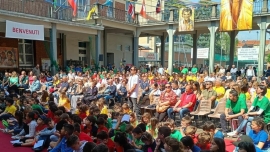Fr Mondin smiles as he remembers the challenge thrown at him three years ago by that little angel with a dirty face. “I sent for his mother, to figure out how to deal with him. She told me: ‘bear with me, I already have two in jail.’ A difficult, often hostile context. "60% of those who end up in juvenile prison come from these streets" Fr Stefano explains, "and many children here think that police and carabinieri are the bad guys. So we organise Legality Week, to make them understand that this is not the case. Police and soldiers came to the oratory and introduced themselves, they also brought dogs and equipment: in the end curiosity overcame prejudice. Then there was the football match between lawyers and magistrates. A way to reduce distances and to understand that inside these institutions there are no enemies but people who can be trusted."
Fr Mondin, who entered the seminary after graduating in Law, proudly displays the "legality bench", painted with the tricolour and autographed by the judges. A few metres away there is a pole with directions to the most troubled corners of the world: Mexico, Ukraine, Haiti, Palestine.
In Barriera di Milano, one in two residents is a foreigner and the proportion leaps to the attention when looking at the 400 members of the summer oratory, where Africans and South Americans stand out. "But we also have many Chinese, who speak Italian so well that they translate it to their parents" the Salesian continues, "Understanding each other is not easy, in addition to language there are very different cultures and traditions. But we make a pact: here you have facilities, volunteers and educators available, but you have to respect the rules. Charity is not lacking, but it is essential to understand that not everything is allowed. And above all that we want to give them tools to start, or to restart.”
An all-Salesian pragmatic approach, which bears fruit even on a seemingly hard ground such as this, further withered by the scourge of digital abuse. "Kids are slaves to social networks and smartphones, they are no longer even there to do their homework: they prefer to connect in video chat [...] And the little ones are influenced by video games.” The antidote to the virtual is contact, relationship. After-school, but above all sports. Football, volleyball, but also walks in the Val d'Aosta. "As soon as they get to the top they ask to make a video to send it to Mum, because, they say she has never seen such a beautiful view."
In a suburb that seems to have lost its identity (the philosopher Michel Foucault spoke of "heterotopia" to describe these urban "non-places", so close but so far from the city centre) the Salesian House is a bulwark of humanity. Not a closed fort, however, if anything an oasis of generosity that keeps the doors open. "None of this would be possible without the efforts of our volunteers: young people, adults, the elderly. There are about three hundred of them and they are fundamental.” A lot of goodwill, but that alone is not enough. "Today we need adequate answers" Fr says, " an outgoing Church means living up to what the world asks of you. This is why we use professional educators who guide the activities and support those who are new. We must make it understood that the oratory is no longer just the place where games are played." Far from it: the House also houses a state-of-the-art school complex, with hypertechnological laboratories also open to schools in the area [...]
The commitment of the Salesians – which also includes courses for starting work in collaboration with companies – is supported by a network of donors: the Carlo Acutis Foundation has given away a digital laboratory, the Amici di Matteo offer consultations in child neuropsychiatry to those who cannot afford private visits and who would risk waiting 2 or 3 years for a diagnosis of attention deficit. But the list of benefactors is long. Vital sap for those who have to carry out their educational and social work in a piece of the city now at high risk.
These are the two faces of the Barriera di Milano district. Those who came from afar and have lost their compass, and those who arrived and left immediately.
Marco Birolini
Source: Avvenire


